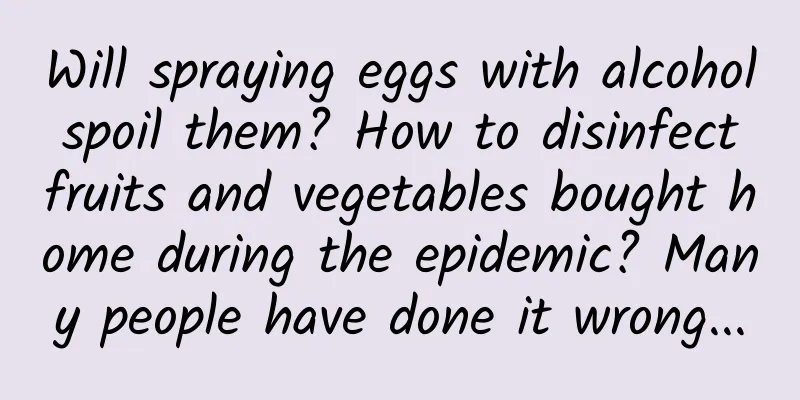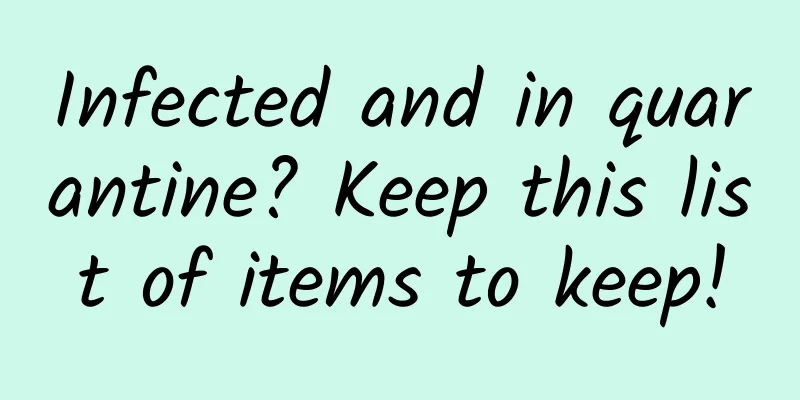Will spraying eggs with alcohol spoil them? How to disinfect fruits and vegetables bought home during the epidemic? Many people have done it wrong...

|
Expert of this article: Fu Shufang, Master of Food Science and Nutrition Engineering, China Agricultural University, technician of the National Key Laboratory of Cardiovascular Diseases Recently, there have been incidents of fruits, cold chain foods, fabrics and other items testing positive in many places. After purchasing them outside, many residents return home as the first thing to do is to disinfect them. They leave them outside for a while, spray them with alcohol, wipe the surface with disinfectant wipes, etc., leaving no corner untouched. Copyright image, no permission to reprint However, some people have raised questions. Disinfection is essential, but will spraying alcohol on vegetables and fruits cause other food safety issues? How to properly disinfect in daily life? What disinfectants should be prepared at home? Does food need to be sterilized? COVID-19 is not a foodborne disease. The risk of infection from eating food is extremely low, so there is no need to panic. Moreover, since the coronavirus needs to parasitize on the body to survive, its own survival ability is very weak. At the same time, the coronavirus prefers a low-temperature and low-humidity environment, and the moist surface of fruits and vegetables is not suitable for the survival of the coronavirus. Under normal conditions, the survival time of the new coronavirus on fruits and vegetables is about 3 days. If certain defenses and disinfection are carried out, the risk of infection by the new coronavirus can be reduced or eliminated. The Taizhou Municipal Market Supervision and Administration Bureau of Zhejiang Province once issued a consumer reminder, urging consumers to try not to buy imported fruits and cold-chain foods of unknown origin, such as purchasing on their own or shopping overseas. If you want to purchase, choose regular supermarkets and markets. How to disinfect food? Generally speaking, we can disinfect the outer packaging of purchased fruits and vegetables, but it is not recommended to use chemical disinfectants to disinfect the fruits and vegetables themselves, as this may pose a food safety hazard and affect the taste. Generally, you only need to wash them clean. If disinfection is really necessary, you can use a registered disinfectant purchased from a formal channel, soak for 10-30 minutes according to the concentration recommended in the instructions, and then rinse with running water to remove the residual disinfectant. Copyright image, no permission to reprint In addition, the higher the concentration of disinfectant, the better. Each disinfectant has a different usage concentration and must be prepared strictly according to the product instructions. It is best to prepare it before use. High-concentration disinfectants are usually more corrosive and irritating, and the risk of residue is also greater. It is worth noting that although 75% ethanol is one of the most commonly used disinfectants, it is not suitable for direct spraying on fruits, vegetables or eggs for disinfection. Especially for leafy vegetables, spraying alcohol will cause the vegetables to age prematurely. Eggs have a water-soluble protective film on their surface. Spraying alcohol will destroy the protective film, making it easier for pathogens to invade the eggs. Although it prevents the new coronavirus, it may cause other serious foodborne diseases. Eggs generally do not need to be sterilized. They can be placed in a refrigerated or cool place, and the shells can be cleaned before cooking. If eggs are sprayed with alcohol, they should be eaten in time and should not be stored for too long. For frozen foods, their outer packaging needs to be disinfected and rinsed with slow water before eating. How to disinfect items purchased online? 1. Receive the goods without contact, wear a mask and gloves, and spray or wipe with 75% ethanol or other chlorine-containing disinfectants outdoors after receiving the express delivery, and then let it stand for 10-30 minutes; 2. Unpack in a well-ventilated place, disinfect the tools used to unpack, and leave the cartons or outer packaging bags outside the door as much as possible; 3. The outer packaging sprayed with disinfectant can be treated as ordinary garbage. If it is confirmed to be contaminated by the new coronavirus, it needs to be treated as medical waste; 4. After bringing fruits and vegetables into the house, they can be left in a dry and ventilated place for another 30 minutes. Rinse them with running water before eating, or soak and disinfect them with a special fruit and vegetable disinfectant according to the indicated concentration. 5. After handling, use soap or hand sanitizer to disinfect and wash your hands according to the "seven-step hand washing method". Copyright image, no permission to reprint What disinfection items should be kept at home? The "Public Protection Guidelines for Pneumonia Caused by Novel Coronavirus" mentions that human coronavirus is sensitive to organic solvents and disinfectants, and 75% alcohol, ether, chloroform, formaldehyde, chlorine-containing disinfectants, peracetic acid and ultraviolet rays can inactivate the virus. We can prepare 75% medical alcohol, alcohol wipes, and chlorine-containing disinfectants (including some disinfectants containing hypochlorous acid and chlorine dioxide) in our homes. Alcohol is flammable and should be used and stored away from open flames. Also avoid spraying it over a large area. It is best to spray it onto a rag first and then wipe it to disinfect. The active ingredient of 84 disinfectant is sodium hypochlorite, which is generally used in the environment and on the surface of objects. Do not use it to disinfect fruits and vegetables. Clothing disinfectants have different active ingredients from environmental disinfectants and are generally not used to disinfect object surfaces and express packaging. In addition, do not spray disinfectant directly on people or their clothing. The probability of human outer clothing carrying the virus is very small, and spraying disinfectant directly on people may cause irritation and cause physical damage. At the same time, short-term spraying will not have a disinfecting effect. Ultraviolet disinfection lamps are usually used in open, unobstructed spaces, such as workshops, canteens, etc., and people are not allowed to be present during irradiation. It is not recommended for use at home. Copyright image, no permission to reprint Generally, it is preferred to open windows for ventilation indoors to achieve air disinfection. You can open windows for ventilation continuously. If this is not possible, it is recommended to open windows once in the morning and once in the afternoon, each time for more than half an hour. If conditions do not allow opening windows for ventilation, you can consider using mechanical means such as exhaust fans and circulating air disinfection machines. The watermarked images and cover images in this article are from the copyright gallery, and the image content is not authorized for reprinting |
<<: Turning water into "milk" is a basic skill for chefs!
>>: The Ditto among plants, a vine with 12 kinds of leaves?!
Recommend
Wang Chong: Business model + team management + traffic breakthrough
Course Catalog: ├──Wang Chong 1.1.mp4 1.11G ├──Wa...
Apple launches new iPod Touch: starting at 1,495 yuan, is it worth buying?
On July 15, Apple's online store showed that ...
Snail mucus contains a cure? Snail: Is it possible that I am also a "barefoot doctor"...
Produced by: Science Popularization China Author:...
Who is the force in the universe that can "tear apart" stars?
Astronomers witnessed 18 voracious black holes te...
Can multi-screen interaction on smart TVs really improve user experience?
Multi-screen interaction centered on TV has gradu...
Former Faraday executive reveals: Jia Yueting won’t be able to pay salaries next year
While many people are waiting for their company&#...
How to make your original articles full of useful information?
"Write articles with more substantive conten...
How to understand user psychology and play the price game?
JD.com once had a female vice president who worke...
Smartisan Phone: The next Xiaomi?
It is late May, and the wave after wave of mobile ...
The third phase of Naige's visual all-round class in May 2020 [full set of complete high-definition courseware]
Naige Visual All-Round Class 3rd Period May 2020 ...
Review of 6 ways to play "crowdfunding fission": two keys to ensure you achieve explosive growth
Fission, a topic that has been talked about so mu...
White porridge and milk are good for the stomach? Don’t believe these 4 stomach-nourishing misunderstandings anymore!
Chinese people know how to eat and are even bette...
Digital marketing makes business decisions more scientific
Digital marketing refers to a marketing method th...
How to use heap and stack in iOS
Both heap and stack are data structures where dat...
7 Practical Guides to Quoting and Placing Information Stream Advertising Channels (Updated in 2016)
This article includes: What is information flow a...









